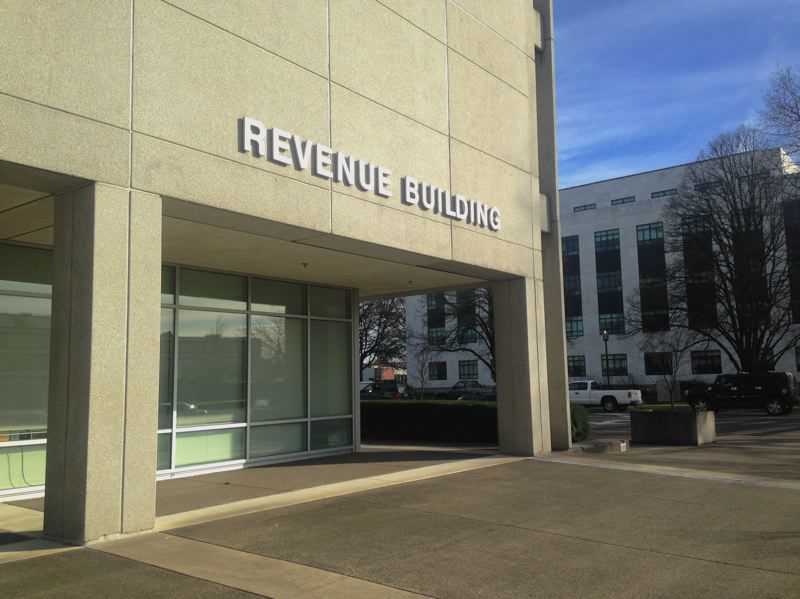State economist predicts 2019 taxpayer ‘kicker’
Published 7:00 am Thursday, May 24, 2018

- CAPITAL BUREAU - About 41.6 percent of Oregon's state and local taxes came from the state income tax in 2015, according to the analysis from the Washington, D.C.-based Tax Foundation.
SALEM — State revenue projections have grown significantly since mid-2017, likely triggering both the personal and corporate income tax “kicker” in the next two-year budget cycle.
The growth is due to recent changes in federal and state tax law and an improved economic outlook, state economist Mark McMullen told lawmakers Wednesday.
Personal income tax projections are now about 3 percent higher than state economists’ close-of-session forecast, a difference that, if revenues hold steady or grow more over the next year, could trigger Oregon’s unique “kicker” law in 2019.
State economists project that about $555.3 million will be returned to personal income taxpayers. The corporate income tax kicker, which is also likely to be triggered, doesn’t go back to taxpayers, but to K-12 education, so state economists expect $196.7 million in funding will be routed to that cause in the next biennium. Expected corporate income tax revenues have leapt about 18 percent since mid-2017.
State economists now expect there will be nearly $772 million more available in the current two-year budget than they expected a few months ago.
But in the next two-year budget, which begins in mid-2019, state economists now expect a $222 million less in available funds.
“The story would be $550 million in increased resources for the two biennia put together, depending on where you want to use it,” McMullen said. Lawmakers will hammer out the next two-year budget in the 2019 legislative session.
Wednesday’s forecast, presented to a joint meeting of the House Revenue Committee and Senate Finance and Revenue Committee, showcased continued disagreement about a tax bill passed in the short legislative session that concluded in March.
That bill disallowed certain business owners from taking a new 20 percent deduction — part of the federal Tax Cuts and Jobs Act, signed into law in December — from qualifying business income on their state tax returns.
That deduction is still available for qualifying Oregon taxpayers on federal tax returns.
Republicans wanted to keep the deduction, which was projected to save state taxpayers $245 million. On Wednesday, they argued that the kicker wouldn’t be triggered if the state hadn’t disallowed that deduction on state taxes.
“In their haste to pass SB 1528 earlier this year, Governor Brown and legislative Democrats apparently failed to recognize that by requiring small business to pay $245 million more in state income taxes, their actions could trigger the income tax kicker,” said House Republican Leader Mike McLane, of Powell Butte, in a prepared statement. “That scenario now appears more likely than not. If current projections hold, Oregonians are in line to receive $555 million of their money back from state government. The irony escapes no one.”
Democrats on the revenue committees, though, characterized the deduction disconnect as a wash since the mid-2017 forecast, the comparison to which determines whether there will be a kicker.
“For practical purposes, it wasn’t a revenue gain as much as it prevented a revenue loss,” said state Sen. Mark Hass, D-Beaverton.
Other factors did drive up projected state revenues, such as other provisions of the federal tax bill, which are expected to swell state tax revenues by $149 million more than expected one year ago.
Gov. Kate Brown took the opportunity to tout her efforts to reduce taxes on small business owners in a special session she convened on Monday. Lawmakers voted to extend a tax break not previously offered to sole proprietors.
“Through both executive action and legislation, we have saved over $400 million in taxpayer dollars since 2015,” Brown said. “When state government lives within its means and the economy grows, hardworking Oregonians benefit in the form of kicker tax credits.”
And although the economy is growing quickly, Brown said, “we must look to the future while addressing our challenges in education, healthcare, transportation and housing affordability.”
Senate Republican Leader Jackie Winters, of Salem, on the other hand, said in a statement that “it remains clear that Oregon does not have a revenue problem, Oregon has a spending problem.”
There is still talk in the wake of Monday’s special session — which created a tax break for certain business owners — more comprehensive revenue reform in 2019. Oregon relies heavily on income taxes, which fluctuate dramatically.
More than one lawmaker, including House Majority Leader Jennifer Williamson, D-Portland and State Rep. Greg Smith, R-Heppner, a member of the House Revenue Committee, warned that the state’s thriving economy would someday take a turn.
“We are fortunate to be on the good side of Oregon’s boom and bust system today, but without structural reform, the good times will not last forever,” Williamson said in a statement. “It is more important than ever for us to work toward stabilizing our state budget so that we can make those much needed and long overdue investments in public schools, health care, public safety and other critical services Oregonians depend on.”
The economy’s growth is slowing, but the chance of a recession soon is relatively low, state economists say.
McMullen also made note of the size of state reserve funds, which as of April stand at nearly $2.2 billion, saying that the state is in a “much better place” compared to the state’s savings position before recessions in the past.





